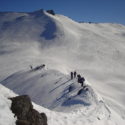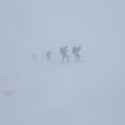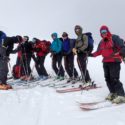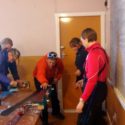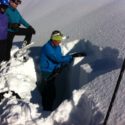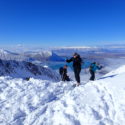The majority of the participants arrived at Newcastle airport hotel on the evening of Saturday 2nd August 2014, eagerly awaiting the long haul flight to Christchurch the next day. Armed with all the paraphernalia required for the three week arduous ski touring event that lay before us, our bags were full to the brim with skis and skins to enable us to walk up the snow covered mountains, along with crampons and ice axes to facilitate the winter mountaineering objective.
The flight was a mighty 27 hours, which saw us land in New Zealand three days later on Tuesday afternoon, arriving at Tekapo Military Training Camp in time for an evening meal and bed. Accommodation was comfortably basic, with incredibly helpful and knowledgeable support staff on hand to recommend the best ski touring locations. After a full day of administration to ensure we had all the basics and enough food for the weeks ahead, skiing began in earnest on Thursday 7th. We initially headed to Roundhill ski fields to try out our equipment and to ‘get our ski legs in’ as some of us had not been skiing for many months. This proved to be difficult as the snow was scarce and the sun was shining, but still it was good to be up in the mountains. In fact this was a theme for the whole expedition, as this was purportedly the worst snow-fall the region had received in around 18 years! We battled on regardless and by Sunday 10th we finally had some fresh powder to ski. This made the long walk up to the summit of Mount Sutton all the more enjoyable and the ski back down through fresh, fluffy, untouched snow was breathtaking. This was the first official tour covered, The Dumbbell Lake Tour, a grade 2/3 so quite challenging for those who had little experience of ski touring before this expedition.
There were a few days when the weather made it impossible to ski – this time was used to great effect with lectures covered for the Ski Foundation 3 qualification that some expedition members were working towards. We also had a practical class on ski maintenance and a trip to the Edmond Hillary Museum amongst other activities, which added value to an already outstanding itinerary. An attempt to ski Mount Dobson was foiled due to the lack of snow which made it impossible to visit the mountain huts that we had planned to make use of. It also denied us the opportunity to tour directly from the military camp, which had been possible on a previous expedition in 2008.
The final few days spent at the military camp saw us back at Roundhill for a day shortened by high winds and encroaching snow that even had the experienced instructors struggling to stay upright in! The conditions provided a fantastic learning environment, as few of us had skied in such demanding and difficult weather and snow conditions previously, so our experience and confidence was increased infinitely. It allowed us to practice avalanche drills, digging into the snow to ascertain the likelihood of an avalanche for dynamic risk assessments, and gave us all the opportunity to learn about utilizing weather and avalanche forecast information online. This ensured we gained experience making decisions about when and where the safest skiing would be and the potential risks to look out for. A particularly interesting lecture on heuristic traps highlighted potential pitfalls of making decisions based on familiarity of terrain, scarcity (of snow for example), commitment or social proof.
The move south to Lake Wanaka was earlier than intended to hopefully find some more snow to build snow holes, practice our off-piste techniques and experience further back country skiing. On Monday 18th we followed the Treble Cone to Coronet Peak Tour – a grade 2/3 – which proved incredibly challenging for some, as we were required to walk across a particularly narrow ridge before attempting the descent. Several members of the group were pushed well out of their comfort zones: more than achieving the aims of Adventurous Training! Once the day was over and the chance for reflection on the tour was provided, it soon became apparent how much we had achieved and how much we had grown through these challenging experiences.
The final day of ski touring was spent on the Mount Cardrona back basin tour (a grade 2), with good snow and a shining sun ensuring we finished on a high. The next day was a free skiing day, so some took the opportunity to hone their alpine skiing technique with lessons from the instructors on the expedition, improving technique dramatically. That evening we moved to Queenstown for a group meal on the Skyline – a gondola ride up to the top of the mountain with beautiful views over the city, ending a fabulous expedition with many learning points, much experience gained and some excellent memories.
Pte Sara Palmer
201 Field Hospital
HQ 2 Medical Brigade

